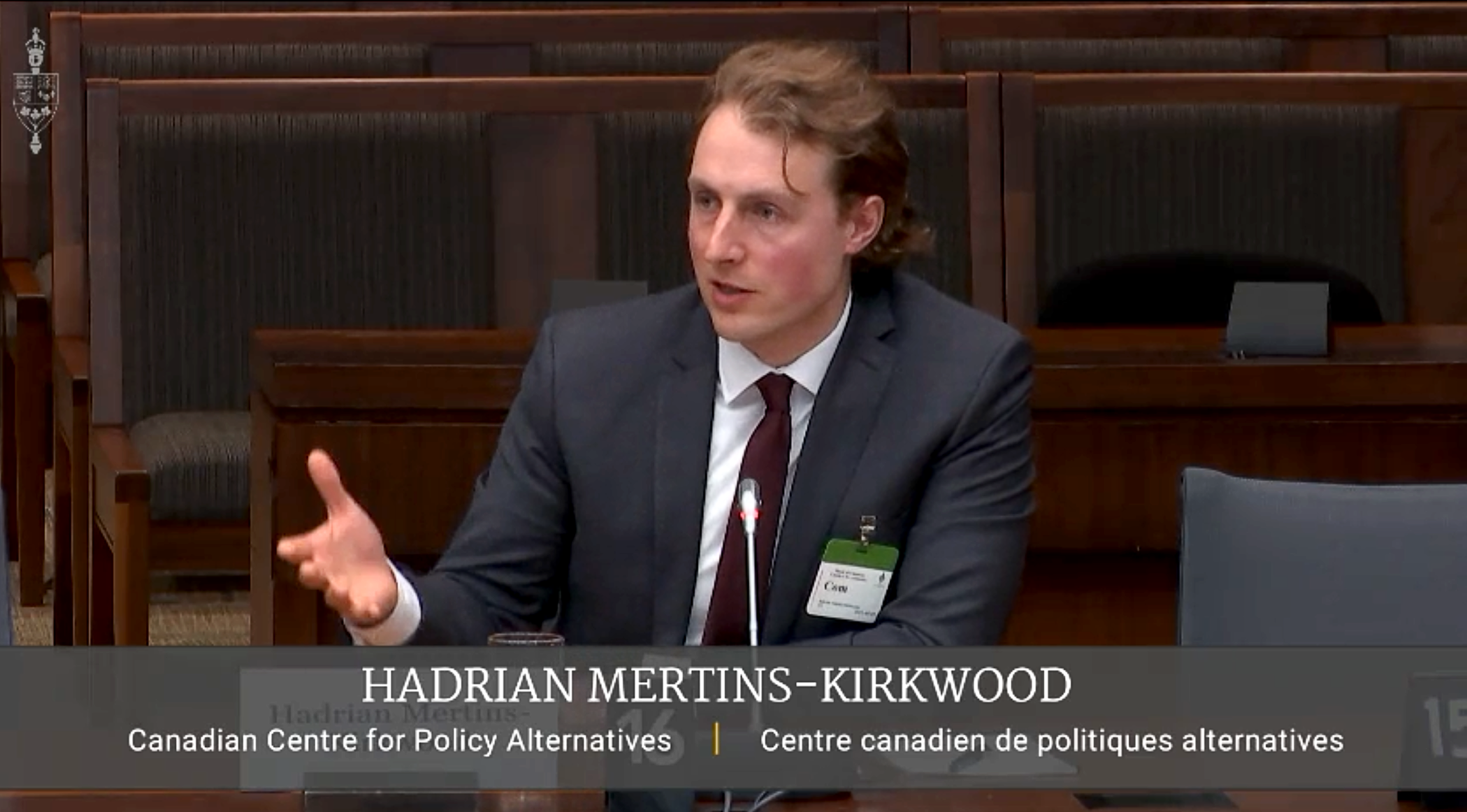Watch Hadrian’s testimony on May 2 here. (Starts at 16:16:27)
Thank you to the committee for the invitation to speak with you about how to create a fair and equitable Canadian energy transformation. My research at the CCPA for the past five years has focused specifically on the issue of a just transition, and I am pleased to have the opportunity to share some lessons of that work with this committee.
The most important point off the top is that a transition to a low-carbon economy is already underway, this is not a future or theoretical problem. The world is moving away from fossil fuels whether we like it or not, so the choice for Canada is between a just, managed transition to a clean economy or an unplanned collapse reminiscent of so many previous resource busts. The status quo, especially when it comes to oil and gas production, is simply not tenable in the long term.
So how do we achieve a transition that is not only just and equitable but also productive and sustainable? There are four key pieces to focus on.
First, when we talk about the energy transition we need to stop talking about emissions reductions in the abstract and be clear about the tangible end goal. To meet our domestic and international climate commitments to avoid the worst impacts of climate change, by 2050 there can be no fossil fuel industry in Canada. Full stop. The question is: what are we doing now that sets us up for that future?
To date, the government of Canada has focused a lot on scaling up the clean economy but hesitated to map out a plan for the fossil fuel industry. In contrast, with the coal transition, the government set a deadline of 2030. That clear timeline was essential not only for environmental reasons, but because it gave affected workers, communities and the industry certainty about the future. It allowed them to plan. We can’t plan for 2050 if we don’t have a clear sense of what that future looks like.
Second, when we talk about the energy transition, we need to recognize that there are actually two distinct transitions happening. There is the transition out of fossil fuels, which impacts the workers and communities who depend on that industry. Then there is the transition into a cleaner economy, which is taking place in every community across the country.
It’s a myth that our fossil fuel workforce will mainly transition into our clean economy workforce. Many coal, oil and natural gas workers today will do their jobs until retirement or transition into other jobs outside the energy industry. On the other hand, most people working in green jobs in ten years will never have worked in the fossil fuel sector. We need very different sets of policies to support these two categories of transition, which affect different kinds of workers in different parts of the country.
Third, to borrow a phrase from my colleague Seth Klein, Canada needs to spend what it takes to win. Transitioning the economy off of a $100-billion per year industry while at the same time trying to decarbonize every other sector of the economy will be extremely expensive. The recent federal budget estimated that to achieve net-zero emissions we need to be investing an extra $100-125 billion per year in the clean economy.
The federal government on its own isn’t responsible for closing that $100-billion per year gap, but it does need to be spending more to accelerate the transition, especially with investments that are targeted at the communities and regions that currently depend on oil and gas. They need alternatives.
Fourth and finally, for a truly equitable transition, we need to look beyond directly affected workers and consider the impacts of transition on everyone in their communities. When Alberta transitioned off of coal power, for example, it provided income support, retraining money, relocation money and other benefits to full-time coal workers, which those workers deserved. But contractors in those facilities, part-time workers and other people who depend indirectly on the coal industry didn’t receive the same kind of support.
Providing broader support is important because the people who work in the energy industry today are disproportionately high-income, white, male and born in Canada. The people in their communities who depend indirectly on that industry—the people who, for example, make lunch for energy workers and also lose their jobs when a project closes down—those people are more likely to be low-income, women, racialized or immigrants. Just transition policies that are too narrow can actually make inequality worse and further marginalize historically excluded groups.
The lesson is not that energy workers don’t deserve support in this transition. They absolutely do. The lesson is that we need to think bigger and more comprehensively about how entire communities transition to ensure that the costs of this inevitable shift to a clean economy are shared fairly and the benefits are shared with everyone. That’s equally important on the training side, where we need to do a much better job of diversifying the professions, like the skilled trades, that are poised for growth in the coming decades.
Thank you again for the invitation. I welcome any questions from the committee.


